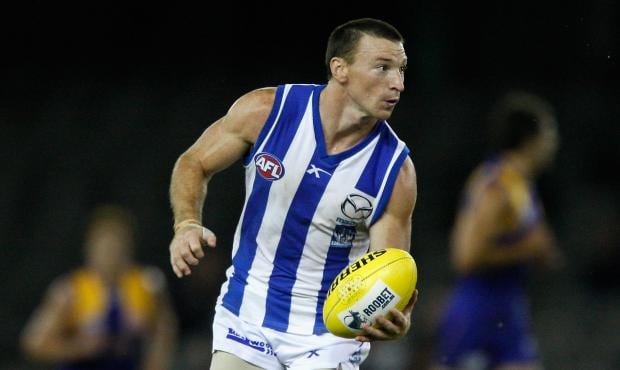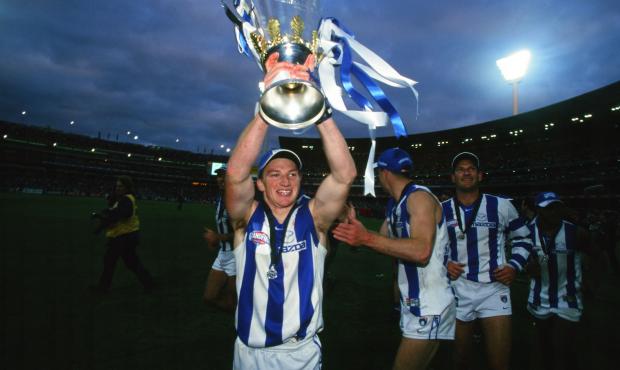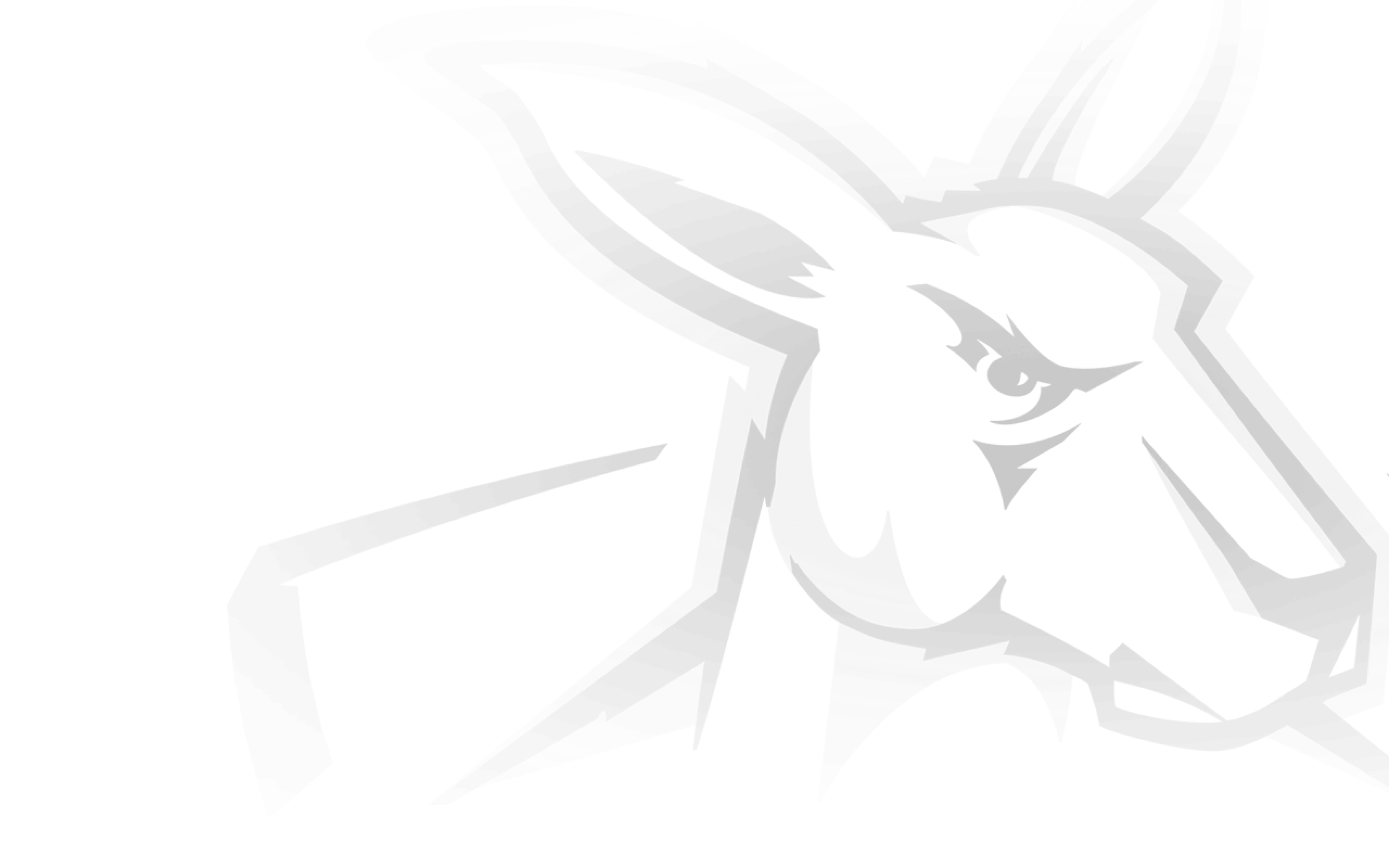Four hundred games is a long time in football. No one knows that better than Brent Harvey.
When the five-time North Melbourne best and fairest winner runs out against the Brisbane Lions at the Gabba, he will become just the fourth player in the AFL/VFL’s 119-season history to join the ‘400 club’.
Harvey arrived at North Melbourne as a 168cm, 68kg terrier from the Northern Knights after the Roos took him at pick No. 47 in the 1995 National Draft.
On Saturday night, he will join retired greats Michael Tuck (426 games) and Kevin Bartlett (403), and 40-year-old Essendon defender Dustin Fletcher (400) in the game’s most exclusive milestone club.
Harvey, 37, spoke to the AFL Record in the lead-up to the game and reflected on how much things have changed in his 20 seasons.
When Harvey arrived at Arden St, Denis Pagan was coach and Wayne Carey captain.
In the previous three seasons, the Roos had shown signs they were on the precipice of a golden era, but were yet to reach a Grand Final under Pagan.
The facilities Harvey walked into were a world away from the state-of-the-art headquarters North players have called home since a $15 million redevelopment in 2009.
The players’ lockers were located in a ramshackle old building that was also cluttered with a few cramped meeting rooms.
The weights room was housed separately in a disused section of the club’s social club, the Kanga Kasino. It was missing the modern weights stations and whiz-bang exercise bikes other clubs took for granted but – as Pagan liked to remind his charges – the Roos’ rusty old weights were just as heavy as their rivals’ shiny new ones.
Harvey would scarcely have believed it if you told him then that post-match video reviews would eventually be done on a computer-operated big screen in a custom-made theatrette.
“With Denis, we used separate ‘good stuff’ and ‘bad stuff’ tapes that we’d have to change over in the VHS (video recorder). Now Brad (Scott) can show behind-the-goal vision and draw on the board on the theatrette screen,” he said.
When the 17-year-old Harvey embarked on his first pre-season in the summer of 1995-96, skills sessions usually ran for about 90 minutes, with 25 minutes of running tacked on at the end. He said last summer those times had blown out to two-and-a-half hours for skills and 45 minutes for running.
And where North never ventured much further than Coburg for summer training under Pagan, Scott has regularly taken his men on high-altitude camps in Utah since 2010.
Harvey said players were part-time employees during the home and away season his first six years, but were now required at the club six days a week.
“When I first started, it was three days a week training. You could certainly come in and do a little bit extra if you needed to, but there were only three official training sessions, two weights sessions and that was pretty much it,” he said.
“Now we’re at the football club from 8am to 3pm every day expect for one day during the week.
“There’s been a few changes (in my time in the game), but the pre-season is probably the biggest thing.
“Every year, probably for the last five years, I’ve thought this can’t possibly get any harder, and for some reason it gets bloody harder.
“You look at the stats at the end of every year and you’ve run an extra 30 or 40km every week and you didn’t think it was possible, but they certainly fit it in there.”
The demands on an AFL footballer have grown so considerably over the past two decades that Harvey believes he will be the last player to reach 400 games.
“The amount of time you now spend at the club during the pre-season and during the year grinds you down a little bit, not only physically but mentally,” he said.
“Everything’s just got bigger, harder and longer, so for that reason I don’t think anyone will reach the 400 milestone again.
“I honestly believe that I’ll be the last player to do that.
“I don’t mean to sound big-headed or anything like that, but the game has changed so much and, if I had started 10 years ago, I wouldn’t be playing 400 games, there’s no way known.”
Harvey’s standing in the game was assured long before he approached the 400-game summit.
As he was starring for the Northern Knights and Vic Metro in his final junior year, there were widespread suspicions in football circles that he was too small to cut it in the AFL.
But the former Geelong supporter has emphatically proved his doubters wrong.
A sneak peak at his football CV tells you that: a record five Syd Barker Medals (2003, 2005, 2007, 2008, 2010) – one more than Carey who is universally acclaimed as the greatest Roo ever – four All-Australian selections (2000, 2005, 2007, 2008), Brownlow Medal runner-up (2007), E.J. Whitten Medal (1999), Jim Stynes Medal (2003) and the AFL Media Association MVP (2008).
Harvey also captained the Roos from 2009-11 and was a key member of their 1999 premiership team.
Equally effective in the midfield and in attack, Harvey has averaged 21.3 possessions a game over his career and kicked the fourth-most goals in the club’s history (466),behind only Carey (671), John Longmire (511) and Jock Spencer (475).
Since Champion Data started keeping records in 1999, Harvey is ranked No. 1 in the competition for total disposals (8044), inside 50s (1444), running bounces (985) and, since 2003, score assists (393).
The veteran has shown no signs of slowing down, either. Last year he averaged 25.4 possessions a game – just down on his career-high 25.5 in 2001 – and in a new role this season, that has seen him play across half-back at times, he is still averaging 23.9.
For most of his career, Harvey has been the man North has turned to when it needs a spark.
More often than not, he has delivered.
Blessed with an explosive turn of speed that has not waned, evasive skills that can make renowned illusionist David Copperfield look like a rank amateur, and more cheek than a Jack Russell, Harvey has made an art out of breaking opposition lines and conjuring goals out of thin air.
A great example was the ‘behind of the year’ he kicked against West Coast in round three, 2010.
Taking the ball at half-back, Harvey took off and had six bounces down the wing as he left Eagle Matt Priddis in his wake. As he approached the forward 50, he feigned a handball to effortlessly make his way around a West Coast defender, then took a seventh bounce and unloaded from 40m.
Much to the chagrin of every North supporter at Etihad Stadium that day – and Channel 10 commentator Stephen Quartermain – Harvey’s shot hit the right-hand post.
 Brent Harvey ran rings around the Eagles at Etihad Stadium in 2010. Picture: AFL Media
Brent Harvey ran rings around the Eagles at Etihad Stadium in 2010. Picture: AFL Media
It was one of Harvey’s rare misfires in a performance that highlighted one of his other defining characteristics – his ability to bounce back from a rare poor performance.
The week before the Roos took on the Eagles, Harvey had been held to just five possessions by St Kilda tagger Clinton Jones as the Saints romped to a 104-point win in Scott’s second game as coach.
It was just the second time Harvey had been kept to such a low possession count since his third season in 1998.
But the then North captain hit back against the Eagles, racking up a career-high 44 possessions to lead the Roos to their first win under Scott.
Three years earlier, he had been kept to seven possessions by feared Geelong tagger Cameron Ling, but bounced back the following week to kick three crucial final-quarter goals in a semi-final win over Hawthorn.
Harvey attributes his ability to rebound so quickly from poor games to a fierce competitive streak.
“I get that from my dad (Neil) and my brother (former Essendon and North player Shane),” Harvey says.
“We all hate losing, the Harveys. Growing up, if you got beaten, even if it was a game of backyard cricket or football, after dinner you wanted to get straight back out there and redeem that.
“I take a lot of pride in my performance, no doubt. I think if I play well, we’ve got a greater chance of winning and I take a loss or bad game pretty personally.
“It probably takes me two or three days to get over and you can’t wait for the next game. Seven days is just too long.
“You want to get back out there, get your hands on the footy and redeem what you did the week before.”
Unfortunately, the team success that Harvey enjoyed in the Pagan-Carey era has dried up in the second half of his career.
Although he could not break into the 1996 premiership team in his debut season, Harvey played in 11 finals over the following four seasons, emerging victorious in seven of them.
In that stretch, he played in four consecutive preliminary finals and the 1998 and 1999 Grand Finals.
After North beat Carlton in the 1999 premiership decider, a 21-year-old Harvey imagined he would play in another two or three flags before he retired.
Unfortunately, since Carey departed the club on the eve of the 2002 season, the Roos have won just three of the 10 finals they have played, their seven losses coming at an average of 74 points.
Their highest finishes in this stretch have been two preliminary final appearances, which ended in an 87-point defeat to Port Adelaide in 2007 and a 71-point loss to the Sydney Swans last year.
Despite this lean run, Harvey has not given up hope he can share the sweet taste of premiership success with the current crop of players.
Asked what North’s 2015 list lacked compared with the Pagan-Carey days, Harvey joked: “I think we lack a Wayne Carey.”
More seriously, he said the Carey-led Roos had a hard-edged dependability that North was striving to emulate.
“You’ve put me on the spot a little bit, but probably we lack the same consistency, knowing every single week what you’re going to get from us,” Harvey said.
“When you lose by 10 goals to Gold Coast, the bottom team on the ladder, or you’re up on Collingwood by 39 points at half-time and you come out and lose, they’re the inconsistencies that I really don’t like in our team at the minute.
“But I think that’s fixable. You’ve just got to keep turning up and get the job done.
“I believe everything we’ve done this year is fixable and hopefully takes us into some finals footy this year.”
Despite the Roos’ recent lack of finals success, Harvey has never stopped enjoying his football.
He says that’s partly because he’s a “glass half-full” person who thinks at the start of every season that North can win the premiership.
It’s also because he loves the club so much and takes such great pride that he will, like Tuck, Bartlett and Fletcher, finish his career a one-club player.
Harvey had big-money offers to leave in the early 2000s, most notably from Carlton, when Pagan took over as coach at the end of 2002, and Hawthorn.
“Your eyes open up when you see all the dollar signs and what they want to give you, but at the end of the day I couldn’t leave the football club,” he said.
 Harvey was just 21 when he became a premiership player in 1999. Picture: AFL Media
Harvey was just 21 when he became a premiership player in 1999. Picture: AFL Media
And while the 1999 premiership understandably remains his fondest memory in football, Harvey says his life membership of North is the personal accolade that he holds dearest.
Asked what made the club so special to him, he highlighted its culture.
“For a long time we didn’t have the facilities some other clubs had, but we had the people we needed around us and the culture that we created was an outstanding culture,” he said.
“I’ve been here for more than half of my life. I got here when I was 17 years old, I’m 37 now, and it’s made me a better person on and off the field, no doubt.
“I had opportunities to leave, but North Melbourne showed faith in me and I’d like to think that I’ve done something to help repay them for picking me up.”
Harvey can rest easy.
Whatever debt he owed North has long since been repaid. Four hundred times over as of Saturday night.

Read more about Brent Harvey in the round 17 edition of the AFL Record, available at all grounds.


